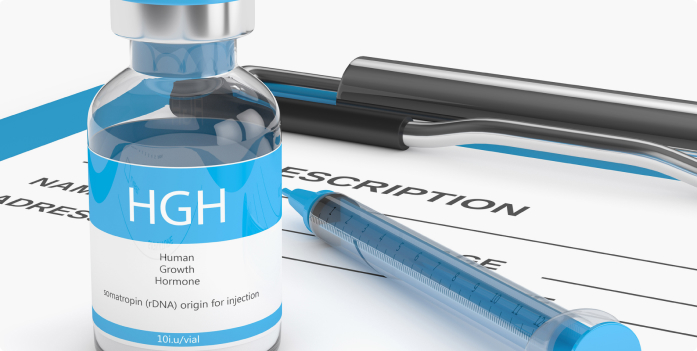
How Long Does HGH Take to Work for Bodybuilding? A Results Timeline
Human Growth Hormone (HGH) begins to show effects for bodybuilding within 2-3 weeks, primarily enhancing workout recovery and initiating fat loss. Muscle growth becomes noticeable with ongoing use, typically taking 6-12 months for significant results.
These effects depend on dosage, nutrition, and individual response. Initial fat loss may appear in the first month, with higher doses accelerating both fat reduction and muscle gain, albeit with increased risk of side effects. Younger athletes often see faster improvements due to naturally higher HGH levels. For those interested, there are more details available regarding its broader impact and safety considerations.
Early Effects of HGH
When beginning the use of Human Growth Hormone (HGH) for bodybuilding, individuals may notice several early effects that reflect the compound’s physiological impact. Initial observations often include enhanced recovery from intense workouts, an essential benefit for athletes seeking to improve training regimens. This recovery enhancement can be attributed to HGH’s role in cellular repair and regeneration, ultimately reducing downtime between sessions.
Adhering to precise HGH dosage guidelines is vital to maximize benefits while minimizing risk. Typical protocols suggest starting with lower doses, gradually adjusting according to individual responses. However, exceeding recommended dosages can lead to potential side effects, including joint pain, insulin resistance, and edema. These adverse effects underscore the importance of medical supervision when utilizing HGH for bodybuilding purposes.
Injection techniques also play a significant role in the effective administration of HGH. Subcutaneous injections are commonly recommended for their ease and efficacy. Proper technique guarantees ideal absorption and minimizes discomfort or complications at the injection site.
Bodybuilders are encouraged to rotate injection sites to prevent tissue damage.
For those cautious of HGH’s side effects, natural alternatives such as amino acid supplementation and adequate nutrition may offer similar benefits without the associated risks. These alternatives can support endogenous hormone production, aiding in muscle repair and recovery.
Muscle Growth Timeline

As the early effects of HGH facilitate enhanced recovery, the subsequent phase focuses on the timeline for muscle growth that athletes can anticipate. Human Growth Hormone (HGH) plays a significant role in muscle recovery and hypertrophy, but the timeline for noticeable muscle growth varies based on several factors.
Generally, athletes may start observing changes within a few weeks, with more substantial muscle growth becoming apparent over several months of consistent use.
Key elements influencing the muscle growth timeline include:
- Dosage Effects: The amount of HGH administered directly impacts muscle growth rates. Higher dosages may accelerate growth, although they also increase the risk of adverse effects. It is essential to adhere to medically advised dosages to balance efficacy and safety.
- Age Factors: Younger athletes might experience faster muscle growth due to higher natural HGH levels and a generally more responsive physiological environment. Older athletes, however, may require longer periods to achieve similar results, potentially necessitating higher dosages or more thorough support strategies.
- Nutrition Impact and Training Synergy: Ideal nutrition and a well-structured training regimen are indispensable in maximizing the benefits of HGH. Adequate protein intake supports muscle repair, while balanced macronutrients and micronutrients facilitate overall health.
Training synergy refers to the alignment of exercise intensity, volume, and recovery periods with HGH therapy, ensuring that workouts effectively stimulate muscle growth.
Fat Loss Expectations

Fat loss is a notable area of interest for athletes utilizing Human Growth Hormone (HGH), owing to its potential effects on body composition. HGH is reputed for its ability to promote lipolysis, the breakdown of fats, which can lead to improved body leanness. However, the degree of fat loss can vary, influenced by several essential factors such as HGH dosage, diet impact, and individual variability.
| Factor | Influence on Fat Loss | Considerations |
| HGH Dosage | Higher doses may enhance fat loss | Increased risk of side effects |
| Diet Impact | Nutrient-rich diets boost outcomes | Poor diets can negate HGH benefits |
| Individual Variability | Genetic and lifestyle factors | Results vary considerably |
The effectiveness of HGH in fat reduction is dose-dependent, with higher doses potentially accelerating fat loss while also increasing the risk of side effects such as joint discomfort and insulin resistance. An ideal HGH dosage should be carefully calibrated to balance efficacy with safety.
Diet plays a pivotal role in maximizing the fat loss benefits of HGH. A balanced, nutrient-dense diet can considerably enhance the hormone’s lipolytic effects, whereas poor dietary habits may impede progress. Athletes are encouraged to maintain a diet rich in lean proteins, healthy fats, and complex carbohydrates to complement HGH therapy.
Individual variability also profoundly affects outcomes, with genetic predispositions and lifestyle choices introducing considerable differences in results. Consequently, some individuals may experience rapid and pronounced fat loss, while others may observe more moderate changes.
Given these factors, it is essential for users to have personalized plans that consider their unique circumstances to achieve ideal fat loss outcomes while minimizing the potential for adverse effects.
Performance Improvements
Releasing the potential of Human Growth Hormone (HGH) for bodybuilding extends beyond aesthetic changes, directly enhancing athletic performance.
The multifaceted benefits of HGH can be essential in optimizing workout outcomes, notably influencing recovery enhancement, strength gains, and endurance boost. These performance improvements are vital for athletes aiming to elevate their training regimens.
HGH plays a significant role in recovery enhancement by accelerating tissue repair and reducing muscle soreness. This accelerated recovery allows athletes to increase workout intensity, as they can return to training more quickly and effectively. As a result, athletes can handle more demanding sessions, leading to greater overall progress and performance.
Several studies highlight the potential of HGH in contributing to notable strength gains. By stimulating protein synthesis and promoting lean muscle mass growth, HGH enables athletes to lift heavier weights and push their physical limits. This effect is beneficial not only for competitive bodybuilders but also for general fitness enthusiasts seeking to improve their strength capacity.
Moreover, HGH provides an endurance boost by enhancing the body’s ability to utilize fat as an energy source, thereby preserving glycogen reserves for prolonged exertion. This endurance enhancement is particularly advantageous for those involved in high-intensity training, allowing for sustained performance over extended periods.
Key performance improvements with HGH include:
- Recovery Enhancement: Faster recovery and reduced muscle soreness.
- Strength Gains: Increased muscle mass and power.
- Endurance Boost: Improved energy utilization and sustained intensity.
Furthermore, HGH may aid in injury prevention by enhancing collagen synthesis, strengthening connective tissues, and promoting overall joint health—essential factors in maintaining long-term athletic viability.
Long-Term Considerations
When considering the long-term use of Human Growth Hormone (HGH) in bodybuilding, it is critical to evaluate both the potential benefits and the associated risks. While HGH can enhance muscle mass and reduce body fat, its prolonged use invites scrutiny from both medical and legal perspectives.
Safety concerns arise primarily from the potential side effects associated with HGH, such as joint pain, insulin resistance, and increased risk of certain cancers. These adverse effects necessitate a cautious approach, especially considering the variability in individual responses to HGH.
Dosage recommendations for HGH in bodybuilding lack standardization and are often based on anecdotal evidence rather than rigorous scientific studies. The absence of consensus increases the risk of misuse, potentially exacerbating negative outcomes.
It is, consequently, imperative that individuals consult healthcare professionals to tailor any HGH regimen to their specific needs, taking into account age factors that may alter the body’s response to the hormone.
Legal implications are a significant consideration, as HGH is classified as a controlled substance in many jurisdictions. Unauthorized use, distribution, or possession can lead to serious legal consequences, further complicating its use in non-medical settings.
Athletes and bodybuilders may also face bans or penalties from sports organizations if found using HGH without a valid prescription.
